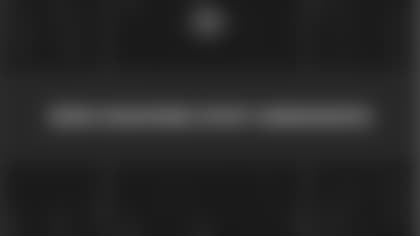The opinions expressed in this article do not reflect those of the team.
The Washington Commanders are taking on the Chicago Bears in a Thursday Night Football matchup. Here are three key to victory, presented by KIA.
1. How can the Commanders keep Justin Fields in the pocket? (Why is that important)
Logan: Much like Tennessee, the Bears' offense is built around the run game. Chicago's three leading rushers -- Khalil Herbert, Justin Fields and David Montgomery -- have combined for 701 yards, while Fields has amassed 679 yards as a passer. Unlike Tennessee, who does this out of choice, Chicago does this out of necessity. Fields has struggled as a passer, and as a result, Chicago has cultivated an offense to insulate his deficiencies.
I noticed when watching tape that Fields looks out of rhythm. He's waiting for the receiver to come open instead of anticipating throwing windows. This leads to him holding the football, and by extension, pressures and sacks. As a result, Chicago tends to avoid straight drop back passes in favor of boots and play action with two-man concepts, promoting easy reads. Despite their best efforts to insulate Fields as a passer, he has the lowest completion percentage in the NFL.
However, Fields has been able to create splash plays using his athleticism. There is an assumption by both offensive and defensive coordinators that the rush will get to the quarterback in approximately three seconds. As a result, offensive concepts and defensive coverages operate in under this parameter. If you can break this parameter and extend the play, defenses are at a disadvantage.
When Fields is not getting sacked, he has been able to break the confines of the pocket and extend plays. He is not as effective in this area as Russell Wilson, who terrorized the league with this play style, but he is able to find explosive plays as a rusher and a passer.
The question then becomes, "How does Washington limit these opportunities for Fields?" It is critical that the defensive line be disciplined in their rush. The defensive ends need to make sure they do not get deeper than the quarterback when rushing and keep lanes from opening in the pocket. The defensive tackles need to make sure they get consistent push up the middle.
This philosophy usually leads to bull rushes, which makes the defensive line less aggressive. However, I would expect the defensive line to counter this by running line stunts to change the angle of their rush and their responsibilities down-to-down.
In addition to a sound rush philosophy, Jack Del Rio can also help the defense by calling more five-man rushes and possibly deploying a spy. The five-man rushes can be done through blitzes or using the Cinco package (five defensive linemen). These five-man rushes are critical because they ensure one-on-ones.
I am generally not a fan of utilizing a spy because it hurts defensive coverage principles. I think it is a viable tool this week because so much of what Fields does in the passing game stems off what he does with his legs. If I was the defensive coordinator, I would consider letting Jamin Davis match up on Fields and let him use that speed to track him down when he breaks the pocket.
Zach: Fields has 49 completions this season, which ranks 32nd out of 47 quarterbacks who have completed at least one pass through five games. All the other signal-callers behind him are either backups or were injured at some point this season and missed time. To Logan's point, the Bears pass the ball 39.8% of the time, which is last in the league.
Washington had a similar issue with Jalen Hurts and the Philadelphia Eagles, although Hurts more gifted as a passer. Hurts, who had rushed for 90 yards against the Lions and 57 against the Minnesota Vikings, was limited to a season-low 20 yards.
Washington pulled this off by being aggressive but not overextending themselves or getting out of their rushing lanes. This will even more important against Fields, who can struggle at times under pressure; against the Giants, for example, he was 1-of-8 when throwing while under duress. Fields has a pressured completion rate of 26.3%, which ranks 32nd.
I like the idea of using Davis as a spy, but I also think it's important for the defensive ends to have a stellar game. Montez Sweat is just a few days removed from his most productive outing of the season, so perhaps he can carry that momentum over to primetime.
2. What can the offense do to get more explosive plays in the offense?
Logan: Finding big plays is a combination of having the right players and scheme. Even though the Commanders have struggled offensively through the first five games, they have shown that they have the personnel to find the big plays. But how do they do it more consistently?
In my experience, the best way to find big plays as an offense is to call plays that stress defensive rules. This can be challenging if the defense is varied in their approach. That is not the case this week. The Bears have a relatively simple defensive philosophy. On first and second down, they play 85% zone coverage and are 84% single-high coverage. Based on these percentages, that means they are cover three team on those downs.
Having this information and seeing this level of consistency allows Scott Turner to cultivate a plan to beat cover three structures, which traditionally have difficulty defending seams routes and the middle of the field behind linebackers, especially when paired with play action. I expect Turner to find plays in his offense that exploit these areas.
Knowing the coverage also helps with the run game. Teams run cover three to bring a safety into the box to help with run fits. This could sound like a negative thing, but it also limits the ways they can line up. As a player, I always enjoyed playing against cover three teams because you knew where they were going to be. There were no questions about the combinations and where they should go. This familiarity should allow the offensive line to play fast and stick to their defenders, which is critical for cultivating explosive runs.
The percentages slightly change in third down situations. The Bears still play a lot of zone, but the percentage of single high coverage sifts to 60%. This tells me two things: take advantage of the consistency on first and second down to find shot plays, and if a team is playing that much zone on third down, they are not a big pressure team.
Can teams play zone and bring pressure? Absolutely. The Bears, however, are not overly aggressive. Coupled with a tepid pass rush, this should allow Carson Wentz to find time to defeat the zones something he struggled to do last week.
The Washington Commanders have left for Chicago to take on the Bears at Soldier Field for a Thursday Night Football primetime matchup. Check out the photos of the players stepping onto the team plane.

































Zach: I'll cover the run game a bit more extensively, because I fervently believe the Commanders can have a good day on the ground. Not only do the Bears give up 170 rushing yards per game, which ranks 31st, but they also have the eighth-worst run defense DVOA in the league, according to Football Outsiders.
We know that the Commanders can operate as a run-dominant offense. They showed as much against the Dallas Cowboys when they outgained Dallas by 70 yards. The Bears give up an average of 4.9 yards per rush attempt, and they allow an average of 10.8 rushing first downs per game.
To me, the best way for Washington to create explosive plays is to lean into the run game. With Brian Robinson back in the fold, the Commanders have the backfield they envisioned in the offseason. Robinson, Antonio Gibson and J.D. McKissic should have plenty of opportunities to excel, and barring penalties that put Washington in difficult down-and-distance situations, they should all get a decent number of carries.
3. Who is one player Washington will need to account for on either side of the ball?
Logan: The Bears are in the middle of what feels like a rebuild. Limited talent and a struggling young quarterback make this game feel like it should be a win for the Commanders. However, the Bears' defense can create turnovers, and no player embodies that for them more than Eddie Jackson.
Jackson has been quiet since 2019, but he has bucked that trend by recording three interceptions in the last four games. It is hard to imagine him not creating turnovers for the defense. Jackson has noted that the Bears' simplified defense allows him to play instinctively as opposed to overthinking. It shows.
Jackson has fluid hips and amazing speed for the position, covering grass at a rate reminiscent of Earl Thomas. He is nowhere near the tackler Thomas was, but Jackson's ability to bait quarterbacks and close throwing windows with his 4.36 speed makes him a dangerous weapon.
Washington must be aware of where Jackson is on the field. One ill-timed turnover could easily switch the tide.
Zach: With Chicago running the ball more than any team in the NFL (60.15%), it is imperative that the Commanders' defense take away leading rusher Khalil Herbert.
Herbert, a 2021 sixth-round pick, only received 103 total carries for 433 yards as a rookie. He is close to shattering both those marks with 328 yards on 56 attempts through five games. Though he is only in his second season, Herbert has already shown that he can trust his blockers, slip through creases and make defenders miss. Based on his small sample size, he looks more like a veteran back as opposed to one still learning the ins and outs of the league.
Washington is around the middle of the pack in terms of rushing defense for the year (14th), but over the past three games, the defense is third in rushing yards allowed (79.7). This is certainly a credit to the front seven, but it also helps to have a player like Kamren Curl, who routinely plays closer to the line of scrimmage, to offer some assistance. Curl has the fifth-highest run defense grade from Pro Football Focus among all safeties.
The Commanders' run defense has been one of the most consistent components on the entire team. If that continues, it could be a solid night for the Burgundy & Gold.
















